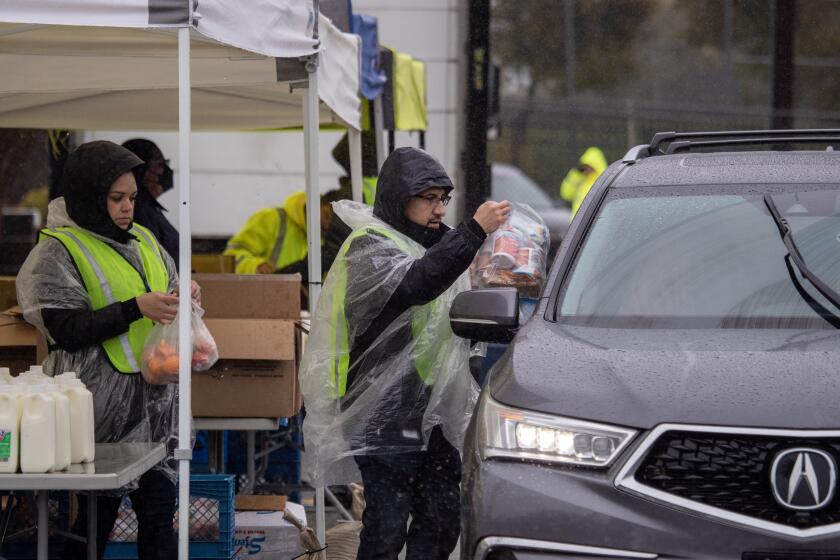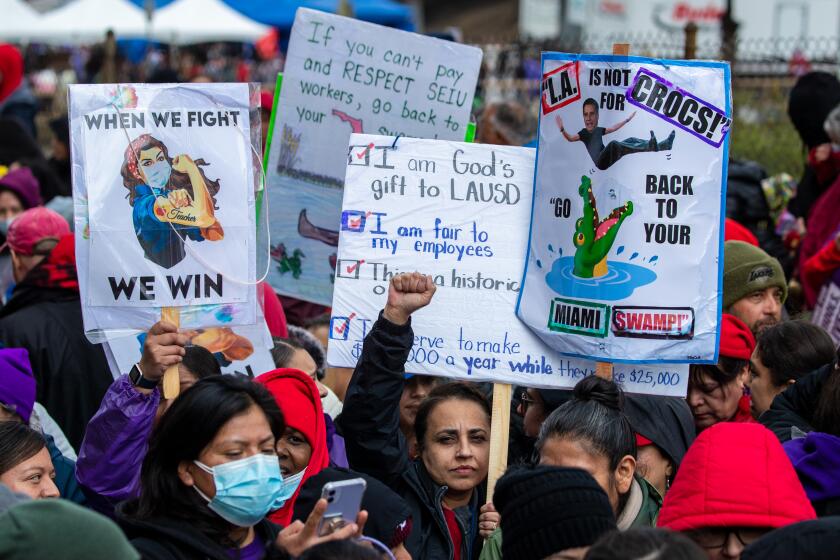L.A. Unified ‘strike camps’ promised child-care relief — if parents could find them
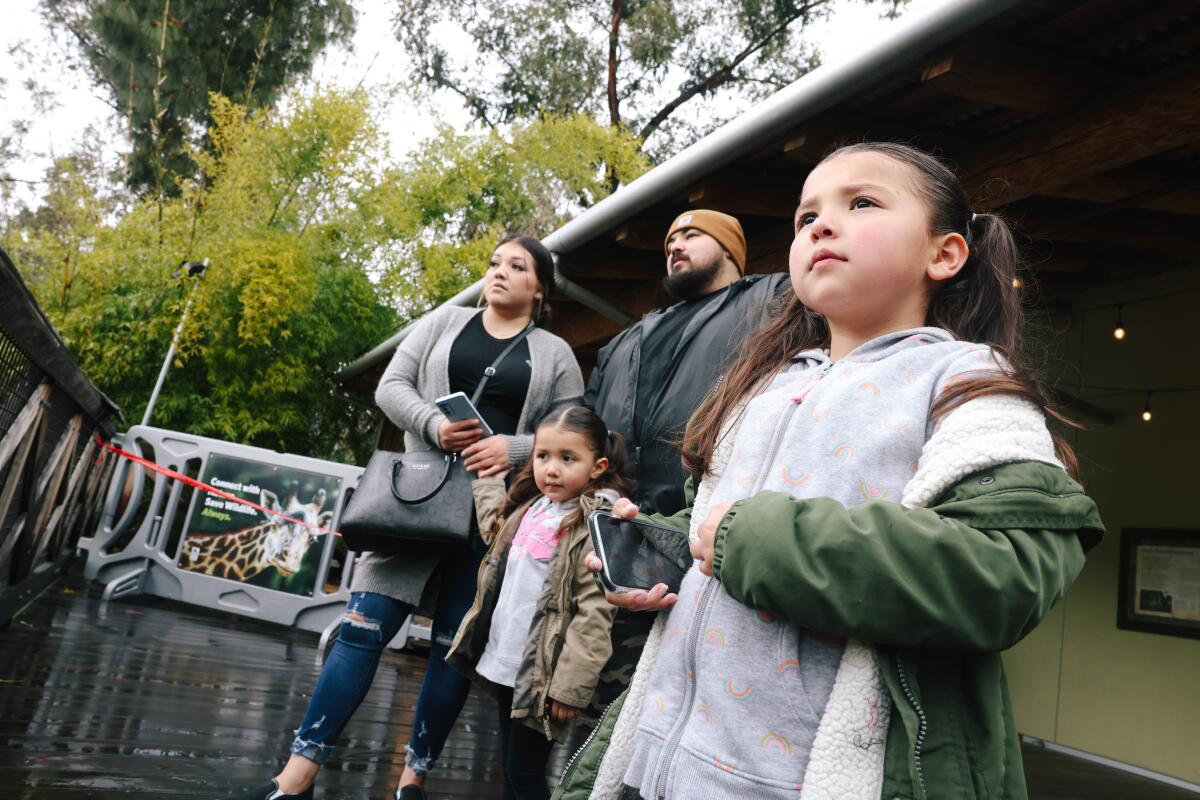
- Share via
Second-grader Kimberly Pedroza shivered outside the Los Angeles Zoo early Wednesday, her squeaky new rubber boots and thin plastic poncho barely shielding her from the sheets of chilly rain.
It was the second day of the massive three-day strike that shuttered L.A. public schools, and Kimberly was one of scores of Los Angeles Unified students who’d pounced at the offer of free admission, creating a sort of improvised, districtwide field trip.
Inside, squawking flamingos seemed to relish the sudden downpour. The elephant, not so much. Parents in plastic ponchos swarmed the gift shop, outfitting their children in umbrella hats printed to look like sharks and tigers, or ponying up for the full-sized number.
Her mother couldn’t take time off to go to the zoo with her, Kimberly said. She “cleans houses for rich people,” the 7-year-old explained.
“Luckily she has me,” her sister, Esmeralda Rubio, 18, chimed in. “But in the case she didn’t, where would she leave her?”
It was a question thousands of LAUSD families found themselves asking late last week, as word of the impending strike reached parents at pickup and on the news.
The walkout is being led by Local 99 of Service Employees International Union, which represents bus drivers, cafeteria workers, custodians and other low-wage workers across the district. United Teachers Los Angeles joined the strike in solidarity, forcing campuses to close.
Over the weekend, the district scrambled to staff day-care programs at select elementary schools, while the city’s parks department put together last-minute “strike camps.”
But while many parents of means splurged for babysitters, hunted down drop-in day-care spots, or queued up for private-pay day camps, most free offerings stood empty. Those that did fill up were all in tonier neighborhoods such as Tarzana, Beverlywood and Fairfax.
“I didn’t know about that,” Rubio said. “All I knew about is this.”
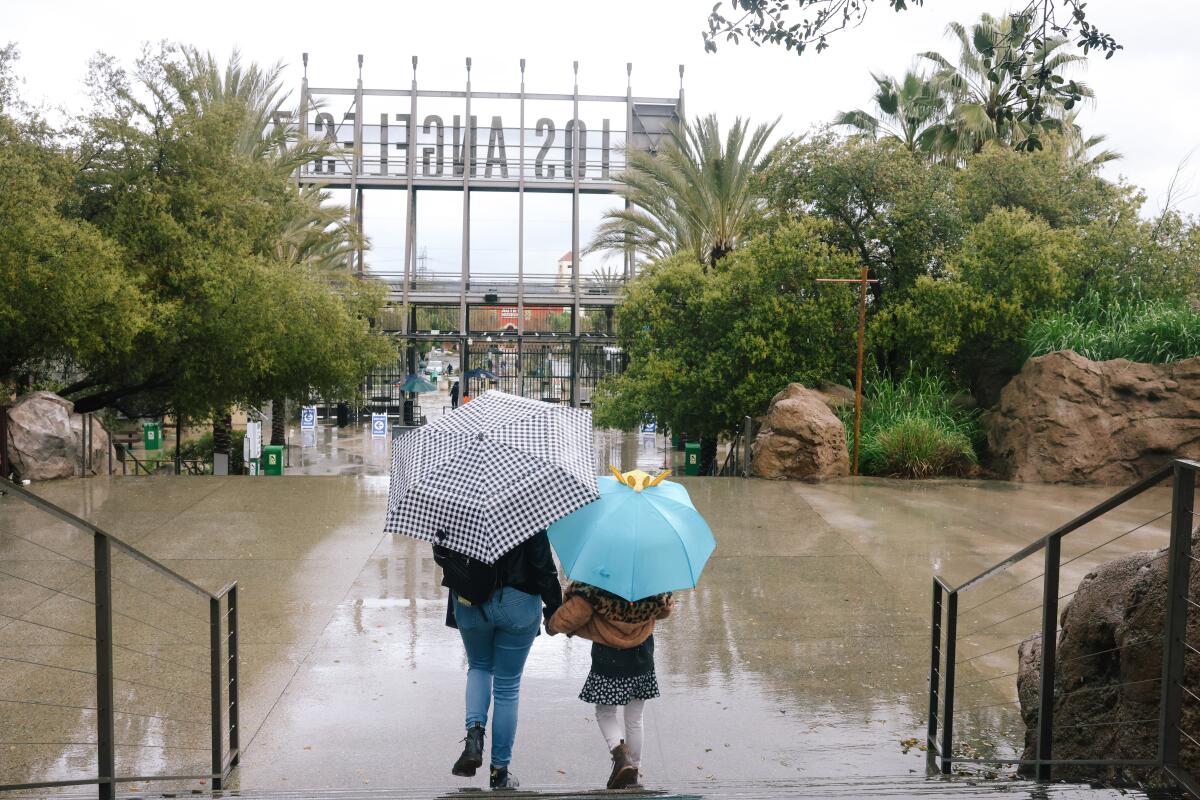
The district handed out 124,526 grab-and-go meal packages Tuesday, each providing breakfast and lunch for three days for one child. That effort reached about a third of its 422,276 students. Yet just over 1,300 students were dropped off at district-run strike camps, and only a few hundred more showed up at those put together by the city.
To be sure, not every family that wanted care ultimately sought it. Some gave up badly needed wages to stay home, while others labored remotely or took their children in tow while they worked.
And some, such as screenwriter Geoff Tock of North Hollywood, took their children to the picket line.
“I hope that he’ll remember this, and that he’ll understand,” he said of his kindergartner. “There’s plenty of people who died for labor in this country; I can risk a cold.”
But many others said they wanted care and didn’t know where to find it.
Baasansuren Altanchimeg of Koreatown collected milk, cereal and fresh fruit for her two young children at the grab-and-go distribution center at Pan Pacific Park on Tuesday morning. She was scared she would lose her job if she missed more work and was desperately seeking care for her 5-year-old daughter and 3-year-old son so she could attend her dental assisting class at American Career College on Wednesday.
Yet she had no idea free child care was being offered just 100 feet away.
“I’m asking my friends to help me take care of them for tomorrow because I can’t miss that school,” Altanchimeg, 24, said. “I do two days a week online and two days on campus, so usually Monday and Wednesday I drop my kids and go to school, and Tuesday, Thursday and Friday I work at the nail salon.”
Parents venture out in a fierce storm to secure three days of food for their children on first day of LAUSD strike
Paola Tejada Lalinde, 38, only learned about the Pan Pacific Park camp late Monday, as she was traveling home from a family funeral with her 4-year-old, Lea, who attends an LAUSD early learning program. By then, most spots were gone.
Yet, despite her advanced education and deep Google skills, she couldn’t find the registration.
“I thought, my husband’s working, it’s late, we’re at the airport, lemme just Google it to see what the conditions are,” she said. “I couldn’t find anything easily at all. I wouldn’t know where to start unless I’d heard it from a friend. Even if I had to pay, I wouldn’t know where to go.”
If missing work had been her only option, she could have borne it, Tejada Lalinde said. But she worried Lea was falling behind.
“She’s 4, and she said, ‘I haven’t written the number ‘4’ in a while, I feel like I’m forgetting,’” the mother recalled.
Amazon driver Karmina Rocha, 28, felt much the same.
“I prefer to have him busy,” she of her kindergartner, Isaiah, who attended the zoo’s $50-a-day strike camp Wednesday.
The camp had been empty Tuesday. But Wednesday and Thursday, it sold out.
“In the beginning I didn’t know [care was available] so I called off work,” Rocha said. “He’s in a [parks department] after-school program, but the park he goes to doesn’t offer a [strike] camp.”
Her experience was a common one. For working-class parents, the price of backup care is often prohibitive, and finding it on short notice felt futile to many. For professionals, the flexibility to work from home or take paid time off may have cushioned the blow.
“Because it was limited to three days, a lot of businesses were very accommodating about families either taking time off or bringing their kids to work,” while others left their children with grandparents or other family in intergenerational homes, said Jenna Schwartz, an LAUSD parent and co-founder of Parents Supporting Teachers. “I don’t know if child care is always the biggest concern.”
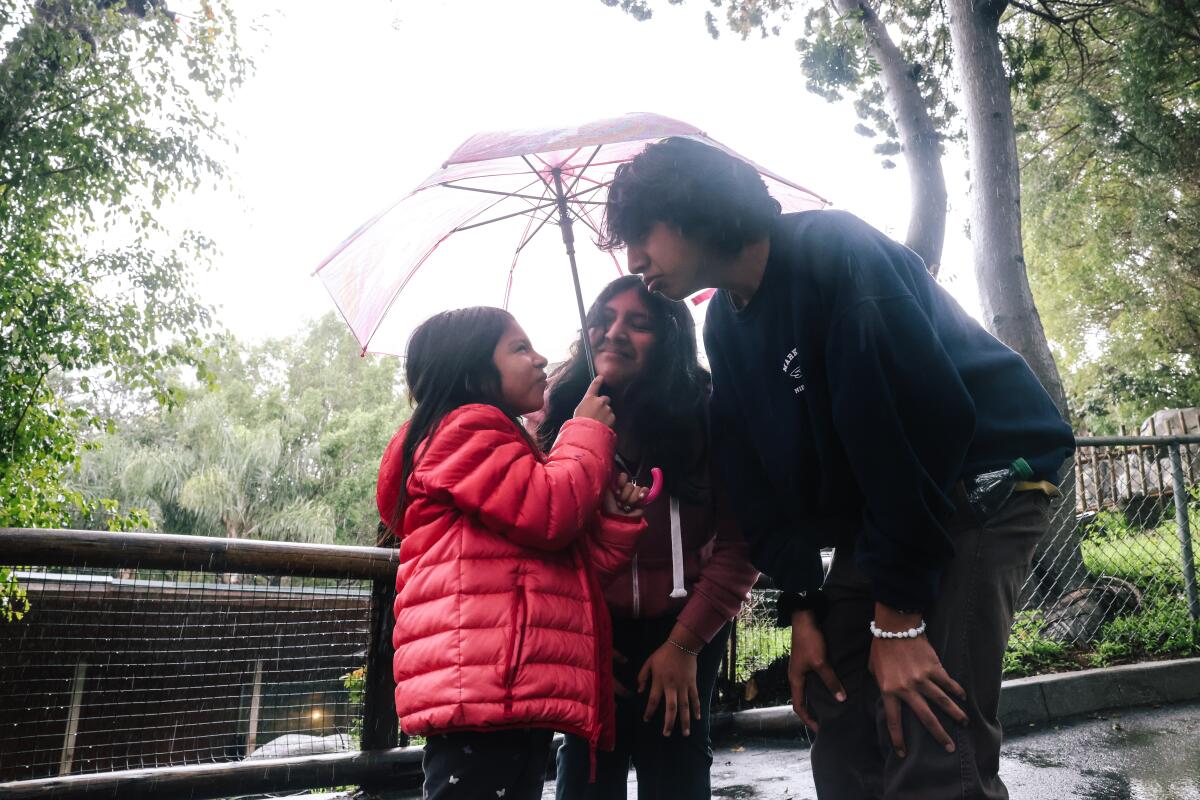
Demand from wealthier Angelenos was also somewhat smaller than expected, said Katie Provinziano, managing director of Westside Nannies, a concierge child-care service based in Beverly Hills.
Nannies command upward of $30 an hour, a steep price even for many working professionals. But anxiety over widespread layoffs in the tech and entertainment industries pushed many parents to take what they could get.
“A lot of moms have those jobs and that’s what’s affording them to live in L.A.,” Provinziano said. They’re thinking, “‘Am I going to be at the bottom of the list because I took three days off, because I didn’t have child care?’”
Still, nowhere was the mismatch between need and availability more pronounced than for parents of disabled children.
“I’ve been talking to people who have children with [individualized education plans] and those people really got screwed,” said mom Mikhaela Cielo of Silver Lake.
Some said they were scared their children wouldn’t adjust to free options. Others said they simply weren’t welcome.
“I’m a single parent; I have to work. I can’t go to the picket lines,” said Vanessa Acuna, whose daughter is autistic and receives special education services from the district. “I opted to place her in a private day camp.”
At $260 for three days, it’s more than she can afford. In her case, she said their regional center, a nonprofit that coordinates services for some Californians with disabilities, agreed to reimburse her for the cost. But she worried few parents know that was an option.
The three-day strike that has closed L.A. schools means many of the district’s lowest-paid workers will lose three days of wages while on the picket line. Many say it’s worth it.
“They’re not reaching out to parents and saying ... we’ll pay for them,” Acuna said.
Indeed, Ramses Mayorga, 30, of Valencia was stunned to learn his 4-year-old, Brayden, who is also autistic, might have qualified to have his care paid for during the strike.
“I’m very shocked and I’d love to know where that information is at,” he said.
With schools closed, Mayorga had been trying to do his case manager job from home, while Brayden’s mother begged for days off from her job as a medical assistant.
“We’ve tried to take him to other programs when situations like this arise or during summer and they’re not welcoming,” he said. “I get teachers want to be compensated, and they deserve to be compensated. However, they’re sacrificing precious moments of children’s lives.”
Still, virtually all parents said three days was manageable. What worried many were rumors the strike could extend past Thursday, or that schools might close again in the near future.
“It will be hard to pay rent, and I might lose my job,” said Altanchimeg, the Koreatown mother. “If it’s more than three days I don’t know what I’ll do.”
More to Read
Sign up for Essential California
The most important California stories and recommendations in your inbox every morning.
You may occasionally receive promotional content from the Los Angeles Times.

